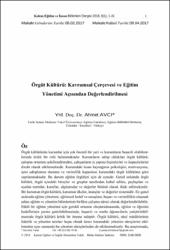Örgüt Kültürü: Kavramsal Çerçevesi ve Eğitim Yönetimi Açısından Değerlendirilmesi
Citation
AVCI, Ahmet. "Örgüt Kültürü: Kavramsal Çerçevesi ve Eğitim Yönetimi Açısından Değerlendirilmesi". Kalem Uluslararası Eğitim ve İnsan Bilimleri Dergisi, 8.1 (2021): 351-365.Abstract
Örgüt kültürünün kurumlar için çok önemli bir yeri ve kurumların başarılı olabilme-lerinde kritik bir rolü bulunmaktadır. Kurumların sahip oldukları örgüt kültürü; çalışma ortamını şekillendirmekte, çalışanların iş yapma biçimlerini ve kapasitelerini direkt olarak etkilemektedir. Kurumdaki insan kaynağının psikolojisi, motivasyonu, işini sahiplenme durumu ve verimlilik kapasitesi kurumdaki örgüt kültürüne göre yapılanmaktadır. Bu durum eğitim örgütleri için de aynıdır. Genel anlamda örgüt kültürü, örgüt içindeki bireyler ve gruplar tarafından kabul edilen, paylaşılan ve uyulan normlar, kurallar, algılamalar ve değerler bütünü olarak ifade edilmektedir. Bir kurumun örgüt kültürü, kurumun ilkeler, inançlar ve değerler sistemidir. En genel anlamda eğitim yönetimi; eğitimsel hedef ve amaçlara, başarı ve verimlilikle ulaşmak adına eğitim ve yönetim bilimlerinin birlikte çalışma süreci olarak değerlendirilebilir. Etkili bir eğitim yönetimi için gerekli ortamın oluşturulmasında, eğitim ve öğretim hedeflerinin yerine getirilebilmesinde, başarılı ve mutlu öğrencilerin yetiştirilebil-mesinde örgüt kültürü kritik bir öneme sahiptir. Örgüt kültürü, okul müdürlerinin liderlik ve yönetim tarzları başta olmak üzere kurumdaki yönetim süreçlerini etki-lemekte aynı zamanda bu yönetim süreçlerinden de etkilenmektedir. Bu araştırmada,okullardaki örgüt kültürünün kritik rolünden hareketle, örgüt kültürünün kavramsal çerçevesi ile örgüt kültürü ve eğitim yönetimi ilişkisi analiz edilecektir. Bu analizde, örgüt kültürünün eğitim yönetimine etkisi, bu etki neticesinde eğitim yönetiminin çıktıları incelenecek, bazı çıkarım ve önerilerde bulunulacaktır. Organizational culture is very important for institutions and has a cri-tical role for institutions to be successful. The organizational culture of institutions forms the working environment and directly affects emp-loyees' way of doing business and their capacities. The psychology, motivation, job ownership status and productivity capacity of the hu-man resource in the institution are organized according to the organi-zational culture in the institution. This is also the same for educational organizations. In the general sense, organizational culture is expressed as the whole of norms, rules, perceptions and values that are accepted, followed and shared by individuals and groups within the organization. Organizational culture of an institution is the system of principles, be-liefs and values of the institution. Organizational culture has a critical importance in establishing the necessary environment for an effective educational administration, in achieving education and training objec-tives and in training successful and happy students. Organizational culture affects the management processes in the institution, especially the leadership and management styles of the school principals, and it is also affected by these management processes. In this research, the re-lationship between organizational culture and educational administra-tion will be analyzed along with the conceptual framework of organi-zational culture based on the critical role of organizational culture in schools. In this analysis, the effect of organization culture on educati-onal administration and the outcomes of educational administration as a result of this effect will be examined, and some deductions and sug-gestions will be made.
Source
Kalem Uluslararası Eğitim ve İnsan Bilimleri DergisiVolume
8Issue
1URI
http://kalemacademy.com/Cms_Data/Sites/KalemAcademy/Files/KalemAcademyRepository/hazir/ahmetavci-2018-8-1-1-41.pdfhttps://hdl.handle.net/11352/3997



















